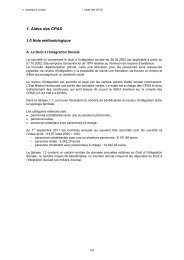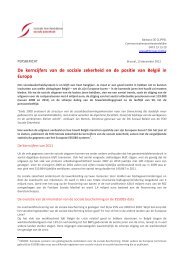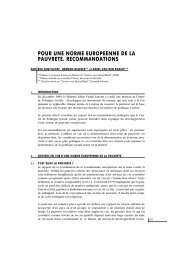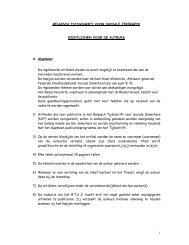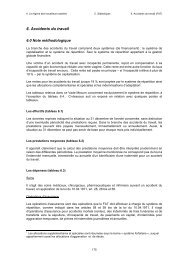social security - FOD Sociale Zekerheid
social security - FOD Sociale Zekerheid
social security - FOD Sociale Zekerheid
- No tags were found...
Create successful ePaper yourself
Turn your PDF publications into a flip-book with our unique Google optimized e-Paper software.
The Belgian <strong>social</strong> <strong>security</strong> scheme for salaried personsA. Scope of applicationUnless stated otherwise by an international agreement, salaried persons employed in Belgiumwith a labour contract at the service of an employer in Belgium or an operational office in Belgium,will in principle be subject to the Belgian <strong>social</strong> <strong>security</strong> scheme for salaried persons.Social <strong>security</strong> for salaried persons applies to any salaried person and employer who arelinked with a labour contract. The existence of a labour contract is crucial.A labour contract is a contract in which a person (the employee) agrees to provide labour inexchange for a salary, to the profit and under the authority of another person (the employer).The employer's authority implies the power (i.e. the possibility and the right) to guide and tosupervise the employee. Still, the employer does not have to exercise that authority permanently.It is enough for the employer to have the right to give the employee instructions about theorganisation and the execution of the work agreed upon.In the field of <strong>social</strong> <strong>security</strong>, the operational office of a company is the office, which usuallypays the employee's wage, which exercises direct authority over the employee and to which theemployee reports about his activities.The Belgian <strong>social</strong> <strong>security</strong> scheme for salaried persons is 'of public order', so it is impossible todeviate from it with special agreements, which would be null and void by law.Almost every international agreement creates the possibility to post workers abroad. Postingmeans that the employer may send an employee, who usually works in his company, abroadfor a well defined short-term mission (particularly to a country Belgium has concluded a <strong>social</strong><strong>security</strong> agreement with). During the posting period, the employee remains exclusively subjectto the <strong>social</strong> <strong>security</strong> scheme he was already subject to before the posting (see the chapter'International aspects of <strong>social</strong> <strong>security</strong>').B. Social <strong>security</strong> contributionsWhen paying the salary, the employer should deduct the contributions due by the employees(personal contributions). The employer adds the contributions he is due (the employer'scontribution). For some categories of employees, contributions are calculated on the basisof a lump sum amount instead of on the gross salary (for instance for fishermen at sea, sportspeople and people working in the catering industry). The lump sum amount varies with theprofession.The employer cannot reclaim contributions from the employee that he himself has forgotten todeduct from his employee's wage earlier.The employer is to pay the total amount of employer's and employee's contributions to theNational Office for Social Security (RSZ - ONSS), acting as a collecting institution for <strong>social</strong> <strong>security</strong>contributions, or to the National Office for Social Security for Provincial and Local Administrations(RSZPPO - ONSSAPL).19



